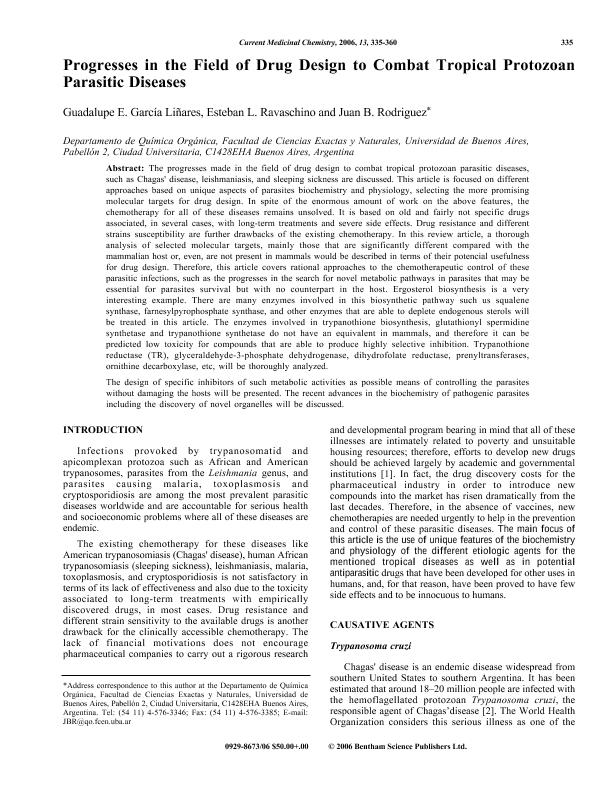Artículo
Progresses in the field of drug design to combat tropical protozoan parasitic diseases
Fecha de publicación:
02/2006
Editorial:
Bentham Science Publishers
Revista:
Current Medicinal Chemistry
ISSN:
0929-8673
Idioma:
Inglés
Tipo de recurso:
Artículo publicado
Clasificación temática:
Resumen
The progresses made in the field of drug design to combat tropical protozoan parasitic diseases, such as Chagas' disease, leishmaniasis, and sleeping sickness are discussed. This article is focused on different approaches based on unique aspects of parasites biochemistry and physiology, selecting the more promising molecular targets for drug design. In spite of the enormous amount of work on the above features, the chemotherapy for all of these diseases remains unsolved. It is based on old and fairly not specific drugs associated, in several cases, with long-term treatments and severe side effects. Drug resistance and different strains susceptibility are further drawbacks of the existing chemotherapy. In this review article, a thorough analysis of selected molecular targets, mainly those that are significantly different compared with the mammalian host or, even, are not present in mammals would be described in terms of their potencial usefulness for drug design. Therefore, this article covers rational approaches to the chemotherapeutic control of these parasitic infections, such as the progresses in the search for novel metabolic pathways in parasites that may be essential for parasites survival but with no counterpart in the host. Ergosterol biosynthesis is a very interesting example. There are many enzymes involved in this biosynthetic pathway such us squalene synthase, farnesylpyrophosphate synthase, and other enzymes that are able to deplete endogenous sterols will be treated in this article. The enzymes involved in trypanothione biosynthesis, glutathionyl spermidine synthetase and trypanothione synthetase do not have an equivalent in mammals, and therefore it can be predicted low toxicity for compounds that are able to produce highly selective inhibition. Trypanothione reductase (TR), glyceraldehyde-3-phosphate dehydrogenase, dihydrofolate reductase, prenyltransferases, ornithine decarboxylase, etc, will be thoroughly analyzed. The design of specific inhibitors of such metabolic activities as possible means of controlling the parasites without damaging the hosts will be presented. The recent advances in the biochemistry of pathogenic parasites including the discovery of novel organelles will be discussed.
Palabras clave:
Chagas disease
,
Trypanosoma cruzi
,
Chemotherapy
,
Molecular targets
Archivos asociados
Licencia
Identificadores
Colecciones
Articulos(UMYMFOR)
Articulos de UNID.MICROANAL.Y MET.FISICOS EN QUIM.ORG.(I)
Articulos de UNID.MICROANAL.Y MET.FISICOS EN QUIM.ORG.(I)
Citación
Garcia Liñares, Guadalupe Eugenia; Ravaschino, Esteban L.; Rodriguez, Juan Bautista; Progresses in the field of drug design to combat tropical protozoan parasitic diseases; Bentham Science Publishers; Current Medicinal Chemistry; 13; 3; 2-2006; 335-360
Compartir
Altmétricas




